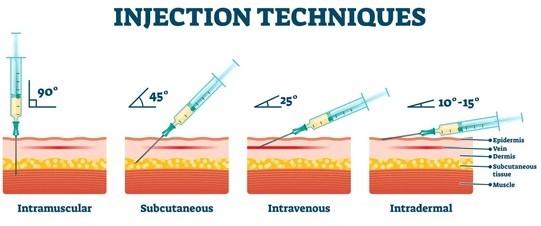A nurse is preparing to administer tetanus and diphtheria toxoids (Td) to a client. What technique the nurse should plan to use?
The Correct Answer is ["intramuscular injection technique"]
The Td vaccine is typically administered into the muscle, most commonly in the deltoid muscle of the upper arm for adults. The IM injection technique involves inserting the needle into the muscle and injecting the vaccine into the muscle tissue.

Nursing Test Bank
Naxlex Comprehensive Predictor Exams
Related Questions
Correct Answer is B
Explanation
Headaches are a common side effect of isosorbide dinitrate, especially when initially starting the medication. However, they often improve as the body adjusts to the medication. It is important to reassure the client that the headaches should decrease over time. If the headaches persist or worsen, the client should inform their healthcare provider for further evaluation and possible adjustment of the medication regimen.
The statement about taking the medication on an empty stomach is not relevant to preventing headaches associated with isosorbide dinitrate.
The statement about swallowing the tablet whole does not address the issue of headaches. Chewable isosorbide dinitrate is designed to be chewed or dissolved in the mouth, and swallowing it whole may not provide the intended therapeutic effect.
Discontinuing the medication until the headache goes away is not recommended without consulting the healthcare provider. Abruptly stopping or changing the dose of isosorbide dinitrate can have serious consequences and should only be done under medical supervision.
Correct Answer is A
Explanation
An incident report is a tool used to document any unexpected or adverse event that occurs in the healthcare setting. It is important to report incidents to ensure proper investigation, analysis, and implementation of measures to prevent future occurrences.
In this example, the incident involves an error with an electronic IV pump resulting in the delivery of an incorrect amount of fluid, which can have serious implications for the client's safety and well-being.
The other examples listed may require further actions but may not necessarily require an incident report:
B. A nurse discovers that a client's family member has administered a PCA dose: While it is concerning that a client's family member administered a patient-controlled analgesia (PCA) dose, it is more appropriate to address this situation through immediate intervention, education, and communication with the healthcare provider. An incident report may not be necessary unless there are further complications or system issues related to this incident.
C. A nurse observes another nurse remove wrist restraints one at a time from a client who is currently calm: While the observation of improper restraint removal raises concerns about proper restraint protocol, it is more appropriate to address this situation through immediate intervention and communication with the involved nurse and healthcare provider. Depending on the severity of the situation, an incident report may or may not be warranted, but it is not the primary action in this case.
D. A nurse observes a client vomiting after receiving an oral pain medication: While it is important to assess and address the client's condition and any adverse reactions, such as vomiting after receiving medication, it may not necessarily require an incident report. The nurse should assess the client, notify the healthcare provider, and document the incident appropriately in the client's medical record.
Whether you are a student looking to ace your exams or a practicing nurse seeking to enhance your expertise , our nursing education contents will empower you with the confidence and competence to make a difference in the lives of patients and become a respected leader in the healthcare field.
Visit Naxlex, invest in your future and unlock endless possibilities with our unparalleled nursing education contents today
Report Wrong Answer on the Current Question
Do you disagree with the answer? If yes, what is your expected answer? Explain.
Kindly be descriptive with the issue you are facing.
